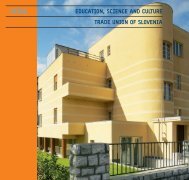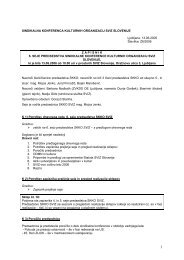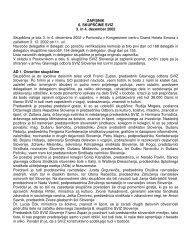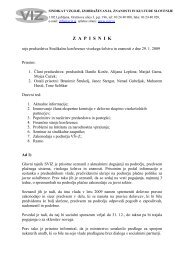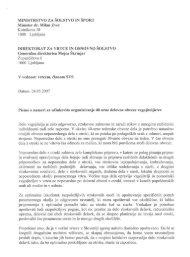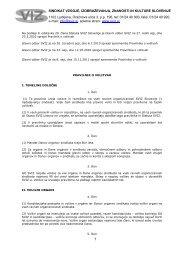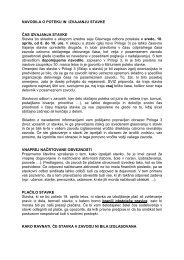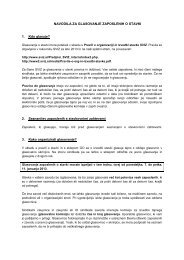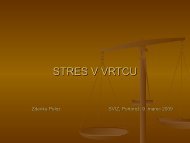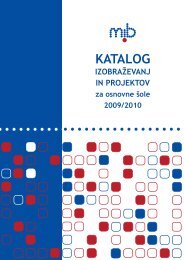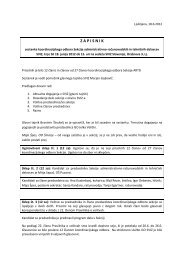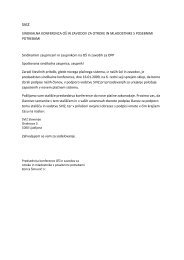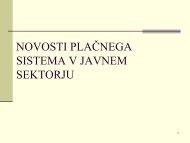The use and misuse of teacher appraisal - Education International
The use and misuse of teacher appraisal - Education International
The use and misuse of teacher appraisal - Education International
You also want an ePaper? Increase the reach of your titles
YUMPU automatically turns print PDFs into web optimized ePapers that Google loves.
T H E U S E A N D M I S U S E O F T E A C H E R A P P R A I S A L<br />
2.2. An overview <strong>of</strong> <strong>teacher</strong> <strong>appraisal</strong> arrangements.<br />
In most jurisdictions, <strong>teacher</strong> <strong>appraisal</strong> methods encompass: (a) self-evaluation; (b) peer<br />
<strong>and</strong> school-leader evaluation; (c) student (<strong>and</strong>, less frequently, parent) surveys/assessment;<br />
(d) external evaluation through inspectors, inspection authorities, assessment centres;<br />
<strong>and</strong>, recently, (e) student-performance test scores. Among countries involved in the<br />
OECD’s Teaching <strong>and</strong> Learning <strong>International</strong> Survey (TALIS), <strong>appraisal</strong> arrangements<br />
tend to be generated more <strong>of</strong>ten from within the school than from an external<br />
source. For instance, over three-quarters <strong>of</strong> <strong>teacher</strong>s in Norway <strong>and</strong> Portugal do not<br />
normally receive feedback from an external agent. In Italy, external <strong>teacher</strong> <strong>appraisal</strong><br />
is virtually non-existent (OECD TALIS, 2009).<br />
Across countries, <strong>appraisal</strong> is carried out using a range <strong>of</strong> methods. <strong>The</strong>se range from<br />
a more formal, objective approach (e.g. as part <strong>of</strong> a formal performance management<br />
system, involving set procedures <strong>and</strong> criteria) to a more informal, subjective one<br />
(e.g. informal discussions with the <strong>teacher</strong>, interviews <strong>and</strong> definition <strong>of</strong> individual pr<strong>of</strong>essional<br />
development plans) (OECD TALIS, 2009). Criteria typically include the subject <strong>and</strong><br />
pedagogical knowledge <strong>of</strong> the <strong>teacher</strong>, some assessment <strong>of</strong> teaching methods, levels<br />
<strong>of</strong> in-service training <strong>and</strong>, increasingly, measures <strong>of</strong> student performance through<br />
st<strong>and</strong>ardised tests.<br />
In many European countries, <strong>teacher</strong>s are not individually appraised through commonly<br />
set procedures within external school evaluation arrangements – a finding confirmed<br />
by Eurydice’s latest key data on education in Europe. However, in several <strong>of</strong> these<br />
countries, <strong>teacher</strong>s may be evaluated in specific circumstances (Eurydice, 2012). In<br />
Estonia, Irel<strong>and</strong> <strong>and</strong> Spain, <strong>teacher</strong>s are assessed when applying for promotion or at<br />
the beginning <strong>of</strong> their career. In Irel<strong>and</strong>, the inspectorate also evaluates <strong>teacher</strong>s at<br />
the request <strong>of</strong> the school management board. In the Nordic countries, <strong>teacher</strong>s are<br />
not evaluated individually, or (in Denmark) not subject to external individual<br />
evaluation. Internal evaluation occurs in all the countries surveyed to a varying<br />
degree, but is not always m<strong>and</strong>atory. With the exception <strong>of</strong> a small number <strong>of</strong><br />
countries such as Engl<strong>and</strong>, Wales <strong>and</strong> Icel<strong>and</strong>, school evaluation systems are centred<br />
mainly on local authorities <strong>and</strong> boards, responsible for evaluating their own educational<br />
provision (for instance Denmark <strong>and</strong> Norway, where local authorities have a duty to<br />
evaluate each school individually).<br />
Teacher <strong>appraisal</strong> is <strong>of</strong>ten linked with career progression <strong>and</strong> changes in a <strong>teacher</strong>’s<br />
responsibilities (although to a varying degree), <strong>and</strong> connected to further opportunities<br />
for (in-service) pr<strong>of</strong>essional development. <strong>The</strong> link with salary <strong>and</strong> pay progression is<br />
not homogeneous: the link exists in Sweden, the UK, the US, <strong>and</strong> Korea, but not in<br />
Italy, Finl<strong>and</strong>, Denmark, Icel<strong>and</strong>, Portugal, France, or Norway, for example.<br />
39



